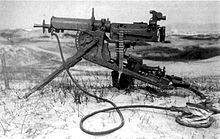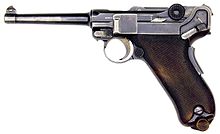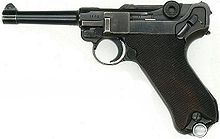- Deutsche Waffen und Munitionsfabriken
-
Deutsche Waffen und Munitionsfabriken Industry Weapons manufacturing Predecessor Ludwig Loewe & Company
Waffenfabrik Mauser
Deutsche Metallpatronenfabrik LorenzFounded 1896 Headquarters Germany Deutsche Waffen- und Munitionsfabriken Aktien-Gesellschaft (German Weapons and Munitions public limited company), known as DWM, was an arms company in Imperial Germany created in 1896 when Ludwig Loewe & Company united its weapons and ammunition production facilities within one company. In 1896 Loewe founded Deutsche Waffen- und Munitionsfabriken with a munitions plant in Karlsruhe (Baden), formerly Deutsche Metallpatronenfabrik Lorenz, and the weapons plant in Berlin. Shares that Loewe had in other gun- and ammunition plants were transferred to DWM. This included Waffenfabrik Mauser, Fabrique Nationale d'Armes de Guerre (FN) in Belgium and Waffen- und Munitionsfabrik A.G. in Budapest. The DWM was orchestrated by Isidor Loewe (1848–1910), as his brother Ludwig had died in 1886. The Loewe family was of Jewish descent. Karl Maybach (who was part of the Maybach company) was employed by the Loewe company in 1901.
Contents
Firearms
DWM introduced the Pistol Parabellum ('Luger Pistol') in the late 1890s. It was worked on by Georg Luger and Hugo Borchardt. DWM manufactured the Maschinengewehr 01 and Maschinengewehr 08, licenced version/clone of the Maxim machine gun. The MG08 would be the main German machine gun of the First World War. Along with being one of the main arms suppliers of Imperial Germany, the company was at the forefront of small arms technology. They also supplied the world (mostly Latin America) with the Mauser rifle system, becoming one of the world's largest arms manufacturers. Due the fact that the Mauser rifle was one of Germany's main exports before the First World War, DWM proved to be an important part of the pre-war German economy. Many of their weapons were still used by German troops up through the Second World War.
DWM had its own system of cartridge codes, and the "DWM" three digit-code still is important in differentiating vintage ammunitions. Furthermore, the DWM cases got no caliber names, so one did not get misleading caliber designations in reformed cartridges.[1]
Takeovers and name changes
DWM was taken over by the Quandt Group in 1929. At this point the involvement of the Loewe company came to an end. The original Ludwig Loewe & Company merged with the 'Gesellschaft für Elektrische Unternehmungen' in 1929.
DWM underwent a number of name changes following World War I and the subsequent disarmament phase. DWM was no longer allowed to produce military equipment after World War I (although they continued on a smaller and somewhat secret scale) and the first name change was to BKIW (Berlin-Karlsruher Industriewerke or 'Berkawerke') in 1922. After the national-socialist takeover of power in Germany, the company added 'vormals Deutsche -Waffen und Munitionsfabriken' (former DWM) to the company name in 1933. In 1936 DWM reverted to its old name.
Deutsche Waggon- und Maschinenfabriken
In the 1950s the Berlin branch of the company started using the name 'Deutsche Waggon- und Maschinenfabriken GmbH', but still using the original DWM logo. The new name reflected the fact that the Berlin branch had switched to the renovation and building of railroad and public transport equipment following the war. The Berlin branch eventually became Waggon Union, a manufacturer of rail vehicles and bus bodies.
Industriewerke Karlsruhe
The Karlsruhe branch changed its name into 'IWK' or 'Industriewerke Karlsruhe' and following a merger with an Augsburg base company 'IWKA' or 'Industriewerke Karlsruhe Augsburg' in 1970. In 2007 the Karlsruhe-Augsburg company moved its seat to Augsburg and reverted to the name 'KUKA', the original name of the Augsburg company, short for 'Keller und Knappich Augsburg'.
Anheuser-Busch
Following the takeover by the Quandt Group in 1929 the manager of DWM, Baron Paul von Gontard, was asked to step down. Paul von Gontard had married Clara Busch, daughter of American Brewer of German origin Adolphus Busch in 1895[1] and joined his wife in the USA, becoming involved in the Anheuser-Busch company.
References
- www.maybach.ru A short biography of Karl Maybach: Engineering in his blood
- Deutsche Waffen und Munitionsfabriken (DWM) Cartridge Identification By Headstamp
- 50 Jahre Deutsche Waffen- und Munitionsfabriken AG, VdI verlag, 1939
- 75 Jahre Industriewerke Karlsruhe, Selbstverlag, 1964.
- Ludwig Loewe & Cie 1869-1929, VdI Verlag, 1930.
- Geschichte der Mauser-Werke, VdI Verlag, 1938.
- FN 100 Years, Francotte & Gaier, Didier Hatier, 1989.
- Die Blutige Internationale, Otto Lehmann-Russbuldt, 1930.
See also
- ^ Manual of Pistol and Revolver Cartridges, Jakob H. Brandt, Schwäbisch-Hall, FRG, 1998
Categories:- Defunct firearms manufacturers
- Firearms manufacturers in Germany
- 1896 establishments in Germany
- Companies established in 1896
Wikimedia Foundation. 2010.



